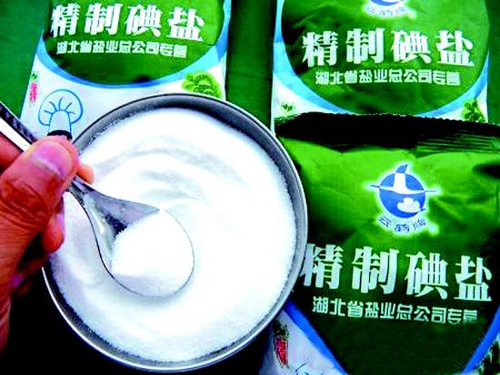 New standard for iodine content per kilogram does not exceed 30 milligrams. New standard will be implemented on March 15 next year. According to the Ministry of Health website, the Ministry of Health recently issued an announcement stating the national standard for food safety, "Iodized salt content in edible salt." The standard makes it clear that after adding the iodine fortifier to the edible salt, the average level of iodine in the salt product (iodized salt) is 20-30 mg/kg. The standard will be implemented on March 15, 2012.
New standard for iodine content per kilogram does not exceed 30 milligrams. New standard will be implemented on March 15 next year. According to the Ministry of Health website, the Ministry of Health recently issued an announcement stating the national standard for food safety, "Iodized salt content in edible salt." The standard makes it clear that after adding the iodine fortifier to the edible salt, the average level of iodine in the salt product (iodized salt) is 20-30 mg/kg. The standard will be implemented on March 15, 2012. The standard states that food fortifiers added to edible salt include potassium iodate, potassium iodide, and algae iodine. In accordance with the provisions of Article 8 of Chapter II of the “Regulations for the Iodine Deficiency Prevention of Iodine Eliminating by Salt†(Decree No. 163 of the State Council of the People's Republic of China), potassium iodate should be mainly used.
According to the standard, after adding iodine fortifier to edible salt, the average level of iodine in the salt (iodine salt) is 20-30 mg/kg. The permissible fluctuation range of the iodine content of edible salt is ±30% of the iodine content of the specified edible salt. The health administrative departments of the people's governments of provinces, autonomous regions, and municipalities directly under the Central Government shall, within the prescribed scope, select the average level of iodine content of edible salt suitable for the local conditions according to the actual iodine nutrition level of the local population.
This national standard has reduced the average level of iodine in edible salt. Previously, according to the "Summary of the Food Hygiene Enhancer Use Hygiene Standard" No. 1, the salt iodine fortification amount was 20-60 mg/kg.
The draft of “Iodized salt for edible salt†was released in July 2010. According to the preparation of the draft, the current level of iodine in salt is relatively high. Although the national level is at an acceptable level, about 5 provinces are in excess levels and 16 provinces are above the appropriate level, so there is room for downward adjustment. In the 10 years after the implementation of salt iodization, excessive iodine can increase the risk of hyperthyroidism; make hidden thyroid autoimmune diseases become dominant diseases; long-term iodine excess can make hypothyroidism or hypothyroidism reduce the risk of illness Increased sex.
Usb Socket,Usb Voltage Socket,Usb Switching Power,Waterproof Wall Switch
Hangzhou Lingjun Technology Co.,Ltd , https://www.lingjunelectrical.com